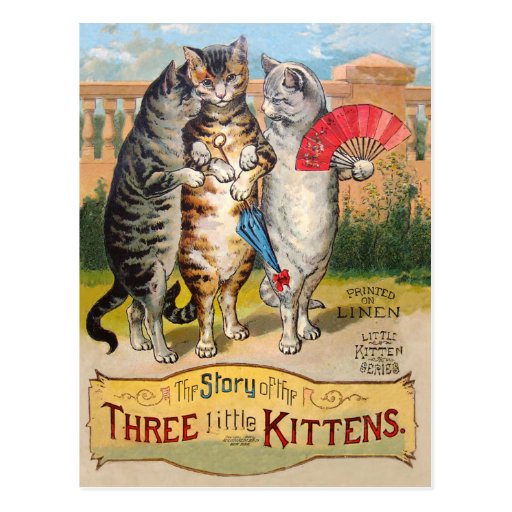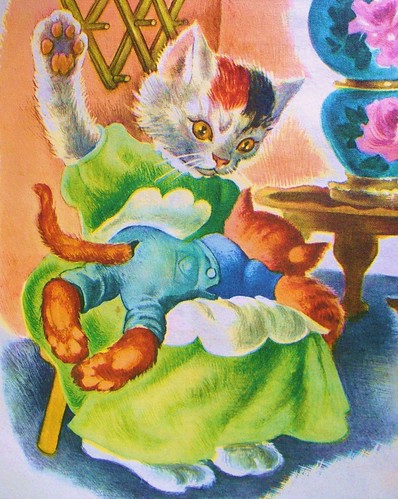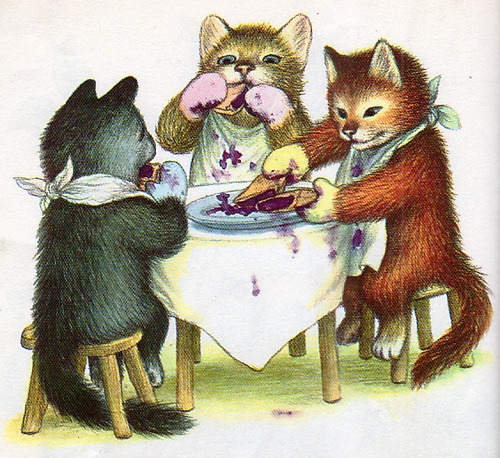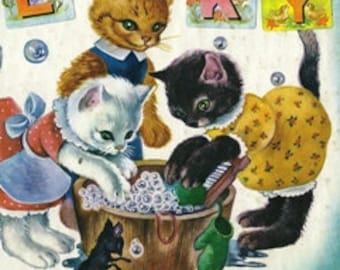Then I remembered that I had promised to make some mittens for Kate so quickly made one pair and posted them off.
After the weekend I had spoken to my daughter and she hadn't mentioned them. I thought that was a long time for them to get there and my impression of the New Zealand postal service lowered a bit. However Monday morning there in the letterbox was my parcel - returned!
Insufficient Postage thank you very much!
"Right", I thought, "I'll fix them!" I opened up the parcel, took some photos (as I had forgotten to for the first ones) and slipped the second pair I had made over the weekend in as well. I then "peeled off" the label, affixed the correct postage and sent them off again.

I was reminded of the nursery rhyme
"Three Little Kittens"
Three little kittens they lost their mittens,
And they began to cry,
What! lost your mittens, you naughty kittens!
Then you shall have no pie.
Mee-ow, mee-ow, mee-ow.
No, you shall have no pie.
And they began to cry,
Oh, mother dear, see here, see here,
Our mittens we have found!
Put on your mittens, you silly kittens,
And you shall have some pie.
Oh, let us have some pie.
The three little kittens put on their mittens,
And soon ate up the pie;
Oh, mother dear, we greatly fear
Our mittens we have soiled.
Then they began to sigh,
Mee-ow, mee-ow, mee-ow.
Then they began to sigh.
Oh! mother dear, do you not hear,
Our mittens we have washed!
What! washed your mittens, then you’re good kittens,
But I smell a rat close by.
Mee-ow, mee-ow, mee-ow.
We smell a rat close by.
Historical Background
"Three Little Kittens" is an English language nursery rhyme, probably with roots in the British folk tradition. It dates to before 1858, when R. N. Ballantyne wrote an amplification of the poem under the championship The Three Little Kittens, published as region of the Good Little Pig's Library, book 1. An often late edition of the tale was published under the Little Golden Books impression in the United States. The rhyme as published today, however, is a sophisticated piece usually attributed to American poet Eliza Lee Cabot Follen (1787-1860). The poem was first published in Britain in 1833 as an anonymous addition to a volume of Follen's verse “Little Songs for Little Boys and Girls”. and in the United States in 1843. Follen may have developed and refined an existing, rude version of the poem, and, in the process, made it her own. With the passage of time, the poem " was hugely popular and quickly absorbed into the Mother Goose collection, “Only True Mother Goose Melodies” in 1843. Its tune is a variant of “The Seven Joys of Mary.” It has a Roud Folk Song Index number of 16150You can read more about its origins here.
“Three Little Kittens” tells a cautionary tale of three kittens, who first lose, then find and soil, their mittens. When all is finally set to rights, the kittens receive their mother's approval and some pie. The profound significance of these verses represents a typical situation involving the relationship between a mother and a child. The child, represented by kittens and the common occurrence of losing an article is subsequently punished. Then finding the lost item, the child is finally rewarded for the good deed.
The word "meeow" shows effective use of onomatopoeia where a word sounds like the action. The mother cat was correct in her view that she could "smell a rat!" It may have been that the kittens had indeed been playing with a rat. The fact that the kittens saw the reward in finding their mittens meant they could have pie, suggesting that good behaviour was rewarded; when their mittens were soiled and they were pronounced naughty, supposes that they washed them to be rewarded again. However “Mother” saw through them!
 The poem is a sophisticated production considered a cornerstone in the shift from moral literature of 19th century children's literature, in favour of anthropomorphic fantasy, satirical nonsense, and word play. It is one of the first pieces of children's romantic literature produced for amusement and entertainment, and may be the source of the idiom "to smell a rat".
The poem is a sophisticated production considered a cornerstone in the shift from moral literature of 19th century children's literature, in favour of anthropomorphic fantasy, satirical nonsense, and word play. It is one of the first pieces of children's romantic literature produced for amusement and entertainment, and may be the source of the idiom "to smell a rat".The poem can be learnt in a request and reaction choral manner featuring the sound of a storyteller and the voices of the kittens. Like most rhymes, this verse is unnamed.
So the mittens I made were in a pure wool. I didn't use a pattern as they are generally just a simple 'bag' with a curved top. I made one with a rib cuff feeding some hat elastic through for tightness and the second had a simple picot edge with a band that I was able to thread some thin elastic through. The second pair also had a little 'snowflake' pattern knitted on the back.








No comments :
Post a Comment